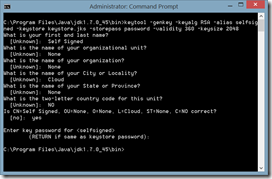
- Keytool Show Certificate
- Keytool Generate Certificate From Private Key West
- Keytool Generate Certificate From Private Key Code
To Use keytool to Create a ServerCertificate
Export/import commands We'll use the keytool -export command to extract the public key into a file, and then use the keytool -import command to insert it into a new keystore. Here's the command to extract the client's public key: keytool -export -alias clientprivate -keystore client.private -file temp.key. Mar 29, 2016 This tutorial explains how to create a public private keystore for client and server. You can use these keystores to secure communication between client and server. Following steps are required for generating a public private keystore. Keytool wraps the public key in an X.509 v1 self-signed certificate. Although you must specify this information when you generate a public-private key pair with keytool, this certificate is not used by Host On-Demand or the SSH server during SSH client authentication using a public key. Apr 27, 2016 First you need to combine the certificate and the private key using the command below. # openssl pkcs12 -export -in certificate.crt -inkey private.key -certfile certificate.crt -name 'mytomcatcertificate' -out keystore.p12 Next you will need to use the java keytool command to create the new keystore in JKS format. Jan 17, 2019 In this tutorial, we demonstrate how to extract a private key from the Java KeyStore (JKS) in your projects using OpenSSL and Keytool. Extracting a Private Key From the Java Keystore (JKS). To Use keytool to Create a Server Certificate. Run keytool to generate a new key pair in the default development keystore file, keystore.jks. This example uses the alias server-alias to generate a new public/private key pair and wrap the public key into a self-signed certificate inside keystore.jks. The key pair is generated by using an algorithm of type RSA, with a default password of changeit.
Run keytool to generate a new key pair in the defaultdevelopment keystore file, keystore.jks. This exampleuses the alias server-alias to generate a new public/privatekey pair and wrap the public key into a self-signed certificate inside keystore.jks. The key pair is generated by using an algorithm oftype RSA, with a default password of changeit. For moreinformation and other examples of creating and managing keystore files, readthe keytool online help at http://download.oracle.com/javase/6/docs/technotes/tools/solaris/keytool.html.
Keytool Show Certificate
The Java keytool utility creates both your private key and your certificate signing request, and saves them to two files: yourcommonname.jks, and yourcommonname.csr. You can then copy the contents of the CSR file and paste it into the CSR text box in our order form.
Keytool Generate Certificate From Private Key West
Note –RSA is public-key encryption technology developed by RSA DataSecurity, Inc.
From the directory in which you want to create the key pair, run keytool as shown in the following steps.
Keytool Generate Certificate From Private Key Code
Generate the server certificate.
Type the keytool command all on one line:
When you press Enter, keytool prompts you to enterthe server name, organizational unit, organization, locality, state, and countrycode.
You must type the server name in response to keytool’sfirst prompt, in which it asks for first and last names. For testing purposes,this can be localhost.
When you run the example applications, the host (server name) specifiedin the keystore must match the host identified in the javaee.server.name property specified in the file tut-install/examples/bp-project/build.properties.
Export the generated server certificate in keystore.jks intothe file server.cer.
Type the keytool commandall on one line:
If you want to have the certificate signed by a CA, read the exampleat http://download.oracle.com/javase/6/docs/technotes/tools/solaris/keytool.html.
To add the server certificate to the truststore file, cacerts.jks, run keytool from the directory where you createdthe keystore and server certificate. /euro-truck-simulator-2-product-key-generator-steam.html.
Use the following parameters:
Information on the certificate, such as that shown next, will appear:
Type yes, then press the Enter or Return key.
The following information appears: